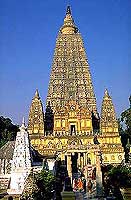India's Supreme Court admits Buddhists' plea to manage Mahabodhi Temple at Bodh Gaya
TNN Sep 22, 2012
NEW DELHI, India -- The Supreme Court on Friday admitted a petition seeking transfer of exclusive management rights of 2,500 year-old Mahabodhi Temple at Bodh Gaya, a World Heritage site since 2002, to the Buddhists from the government.
 << The revered Mahabodhi Temple in Bodhgaya, India, location where the Buddha attained supreme Enlightenment (Nirvana)
<< The revered Mahabodhi Temple in Bodhgaya, India, location where the Buddha attained supreme Enlightenment (Nirvana)
A bench of Justices Altamas Kabir and J Chelameswar issued notices to the Centre, Bihar government and Archaeological Survey of India (ASI) on a petition by the Buddhist organization, Bhante Arya Nagarjun Shurai Sasai, and sought Attorney General G E Vahanvati's assistance in the matter.
Appearing for the petitioner, senior advocate Rajeev Dhavan said the management of the holiest Buddhist shrine by persons from other religions hurt the religious sentiments of the Buddhists and questioned the constitutional validity of provisions of 60-year-old Bodh Gaya Temple management Act, which permitted it.
The petitioner said, "Lakhs of Indian Buddhists continue to be denied the exclusive right of management and control of the Mahabodhi Temple in Bodh Gaya, Bihar, on account of the offending provisions of the 1949 Act. At present, due to mismanagement and indifference to the temple, the sacred Bodhi tree is in danger of decay as found by a committee of the ASI."
The Indian National Congress had in 1922 appointed a committee headed by Dr Rajendra Prasad, which had recommended joint management of the shrine by both the Hindus and the Buddhists. After independence, the Bihar government implemented the recommendations and enacted the 1949 Act.
"The Act ended the Mahant's monopoly over the shrine. However, it entrusted the temple management to a nine-member committee comprising five Hindus and four Buddhists and giving hereditary membership to Saivite Mahant and his successors in Bodh Gaya Temple Management Committee," the petitioner said and complained that the decision by the Hindu members, who had majority, prevailed over the opinion of the Buddhists.
According to the Unesco, which gave it World Heritage site status, "The Mahabodhi Temple Complex is one of the four holy sites related to the life of the Lord Buddha, and particularly to the attainment of Enlightenment. The first temple was built by Emperor Asoka in the 3rd Century B.C., and the present temple dates from the 5th or 6th centuries. It is one of the earliest Buddhist temples built entirely in brick, still standing in India, from the late Gupta period."

 << The revered Mahabodhi Temple in Bodhgaya, India, location where the Buddha attained supreme Enlightenment (Nirvana)
<< The revered Mahabodhi Temple in Bodhgaya, India, location where the Buddha attained supreme Enlightenment (Nirvana)